Feature Stories
- Home
- Why KOREA
- Feature Stories
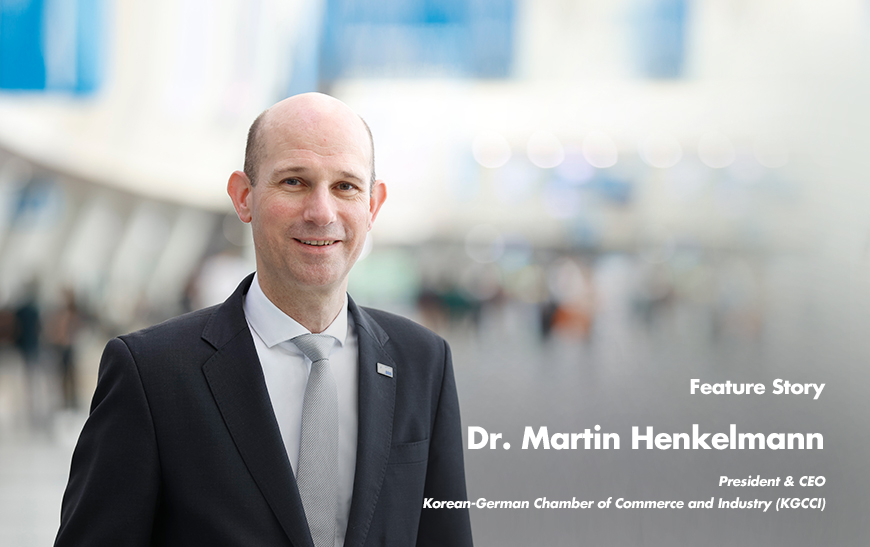
Invest KOREA talks to Dr. Martin Henkelmann, President & CEO of the Korean-German Chamber of Commerce and Industry (KGCCI) to hear about his career experience and the long-standing business partnership between Korea and Germany.
Since May 2021, Dr. Henkelmann has been spearheading the Korean-German Chamber of Commerce and Industry (KGCCI) as President & CEO, guiding the growing team out of the pandemic period. He has been innovating the service portfolio as well as the event formats and increased the Chamber’s visibility in the media while strengthening and enlarging the cooperation with strategic partners. A passionate tennis and field hockey player, he lives in Seoul with his wife and their two children.
Read on to hear more about Dr. Henkelmann’s career experience as well as the long-standing business partnership between Korea and Germany.
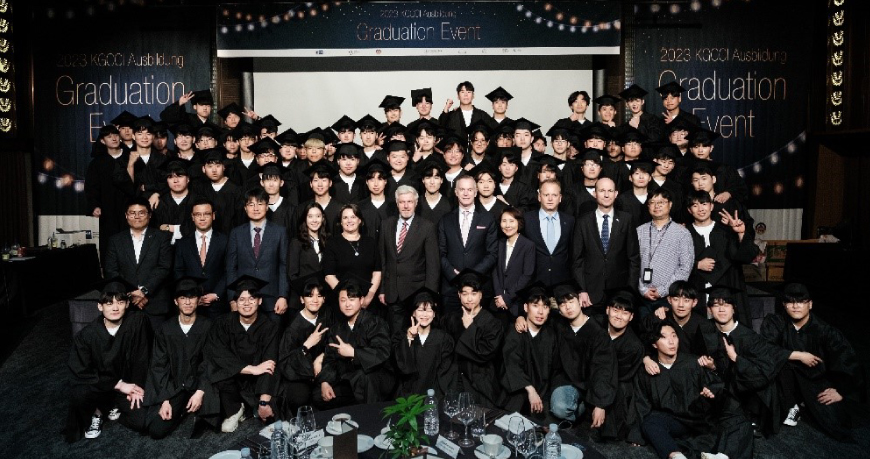
Throughout my career, my passion has always been to work with companies in an international environment. I studied law in Germany and France and worked afterwards in a law firm, an advocacy consultancy, and a large business association.
My tasks led me to Brussels, Berlin, and Paris among others. In 2014, I had the opportunity to join the powerful global network of German Chambers of Commerce Abroad (Auslandshandelskammern). Initially, I served as the head of the German-Tunisian Chamber, then the German Chamber in the Philippines. Since 2021, I’ve been in Korea, serving as President and CEO of the Korean-German Chamber of Commerce and Industry.
Can you tell us about KGCCI and its history? What is the Chamber’s main mission and projects in Korea’s business and industry circles?
Established 42 years ago, KGCCI is the second-largest foreign chamber of commerce in Korea with around 500 members and a dedicated team of 28 multilingual employees. With a strong focus on facilitating business between Germany and Korea, KGCCI provides comprehensive supports to German companies entering the Korean Market and vice versa. This includes in-depth market analysis, facilitating delegation visits, B2B matchmaking and other services aimed at fostering successful business collaborations.
KGCCI serves as an essential information platform, offering various publications such as the business magazine “KORUM”, a Business Confidence Survey that depicts German companies’ assessment of the Korean market, and an annual CSR Report of German companies and weekly newsletters. Moreover, KGCCI organizes many networking and information events and voices the recommendations of the German-Korean business community.
Also, KGCCI has been supporting uncountable numbers of Korean companies to participate in leading trade fairs in Germany. KGCCI has been the official representative of renowned trade fairs such as Messe Berlin, IFA, Messe Stuttgart, and Spielwarenmesse Nürnberg for many years. Since 2021, KGCCI has been hosting the Secretariat of the Korean-German Energy Partnership in Korea, reaffirming its dedications to promote sustainable and innovative energy collaborations.
Some of our signature projects include the annual KGCCI Innovation Awards, the cross-industry, cross-national mentoring program for female executives “Women in Korea” (WIR/우리) and the German-Korean Vocational Training (Ausbildung) program, fostering the development of skilled professionals in various industries.
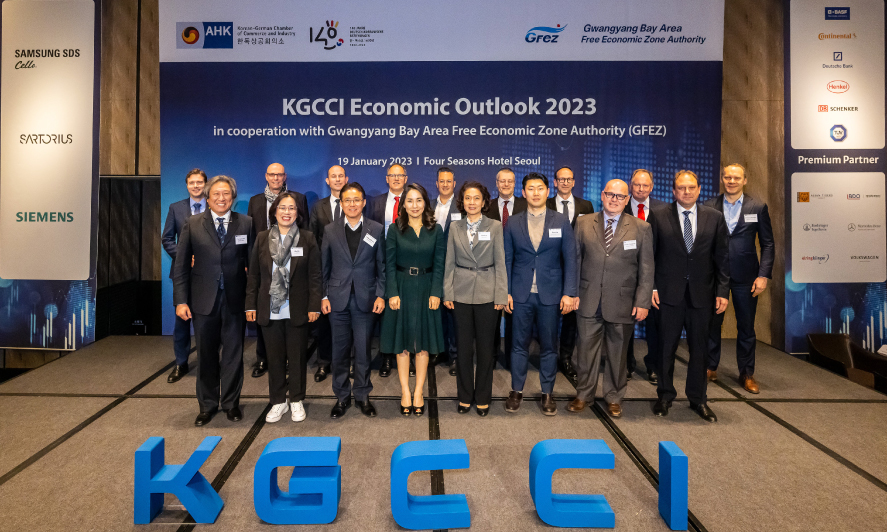
We are immensely honored to have grown close and trusting ties to many esteemed partners in Korea. We appreciate the strong cooperation with KOTRA, the Foreign Investment Ombudsman and many Ministries, particularly the Ministry of Trade, Industry and Energy (MOTIE). We are grateful for the fruitful collaboration with regions such as Gyeonggi and Jeonbuk. Additionally, the Free Economic Zones including Incheon, Gyeonggi, Ulsan, Busan, Deagu-Gyeongbuk and Gwangyang have played a pivotal role in promoting investment and trade opportunities. The city of Seoul and Ansan have also been exceptional partners and within the private sector, we particularly commend our partnership with KCCI and KITA.
Is Korea an important market for German companies? In what areas of Korea’s business and industries are German companies flourishing?
The significance of the Korean market has grown tremendously. For Germany, Korea is its third largest trading partner in Asia.
Particularly, German companies have been very competitive in Korea’s cars and automotive, pharmaceuticals and chemicals, as well as mechanical engineering industries. Additionally, German players have a strong footprint in many other sectors such as logistics, consumer goods, financial services, testing and certification.
What would you say are the advantages of doing business in Korea?
First of all, Korea has an outstanding ICT infrastructure that spans the entire country. This robust network facilitates seamless connectivity and enables companies to leverage advanced technological capabilities in their operations. Additionally, companies appreciate the dense network of roads and railways as well as the ports.
Secondly, Korea is highly industrialized with Korean companies leading the way in key products, such as batteries and semiconductors. By establishing a presence in Korea, German companies operating in these fields can contribute and participate as well as foster collaboration with Korean counterparts.
Thirdly, when it comes to consumer goods, Korea has a very elevated GDP-per-capita ratio and Koreans value high-end and top-quality products. Furthermore, Korea is a lead market and serves as a gateway to many other counties, particularly in Southeast Asia.
What are the shared interests or growth opportunities that both countries can mutually benefit from through collaboration?
Korea and Germany share numerous common interests as both countries have a strong industry. Successful and mutually beneficial collaboration will bring us forward solving the challenges of de-carbonizing our industries. Germany has extensive experience in renewable energy production and capable companies in this field. Additionally, Korea and Germany need to move quickly when it comes to hydrogen. Both countries are also home to several of the world’s largest car manufacturers. They are embracing the new opportunities linked to e-mobility and autonomous driving while the way is still long and costly. Joint efforts could create added value here as well.
On a broader scale, both countries need to collaborate closely to enact an international rule-based economic order as their businesses are export-oriented and need a reliable economic environment globally.
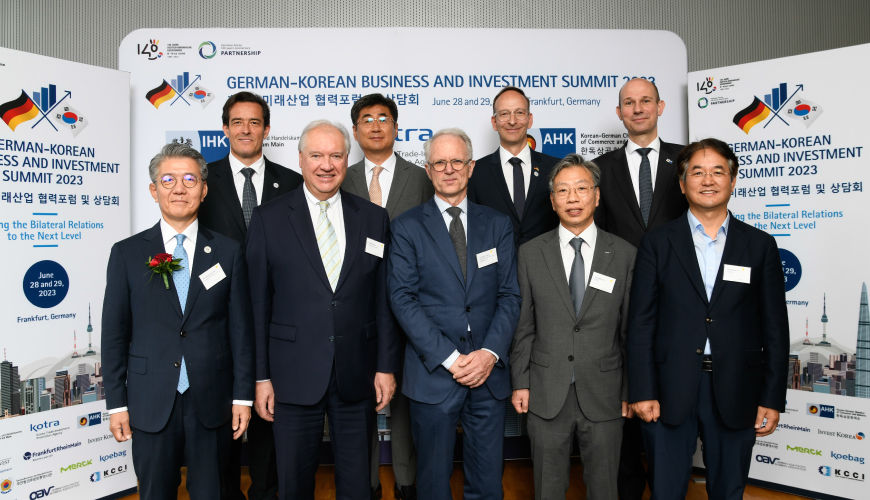
The political relationship between Korea and Germany has grown over the past decades. Notably, the visits of the German Federal President Frank-Walter Steinmeier and the German Chancellor Olaf Scholz to Korea within a span of seven months underscored the close ties between the two countries.
Our economic interlinkage is robust and continues to strengthen. The bilateral trade volume reached an all-time high of USD 33,682,588,000 in 2022. Investment from Germany to Korea is an accumulated USD 13.7 billion (1964-2022), Korean investment in Germany USD 3.6 billion (2015-2022). Beyond the macroeconomic indicators, numerous collaborations between German and Korean companies are taking place across various sectors.
Both timely and relevant, the German Korean Business Summit was held at the end of June in Frankfurt. What was the overall theme and purpose of this event, as well as the main topics of discussion?
The Business and Investment Summit, jointly organized by the IHK Frankfurt, KOTRA, KGCCI and DIHK and supported by KCCI and OAV, proved to be a highly impactful event that, propelling our business relations to new heights. The varied and wide organization group enabled us to address all relevant economic topics and to bring our business relations to the next level, as the title of the event states.
The summit provided a platform to reunite high-level speakers from the realms of politics, administration and renowned Korean and German companies. Spanning two days, the event focused on the important topics that impact our companies and bilateral economic relations, such as digitalization, securing global supply chains and decarbonizing our industries.
What are your future hopes and goals for Korean-German cooperation in the areas of trade and investment?
First and foremost, I hope that the trade and investment volume continue to flourish, driven by the competitive spirit and growing collaboration within our industries.
Secondly, it would be great if we see some lighthouse project investments in future-orientated key technologies for which the ribbon-cutting could take place when we celebrate 145 years of German-Korean relations in 2028.
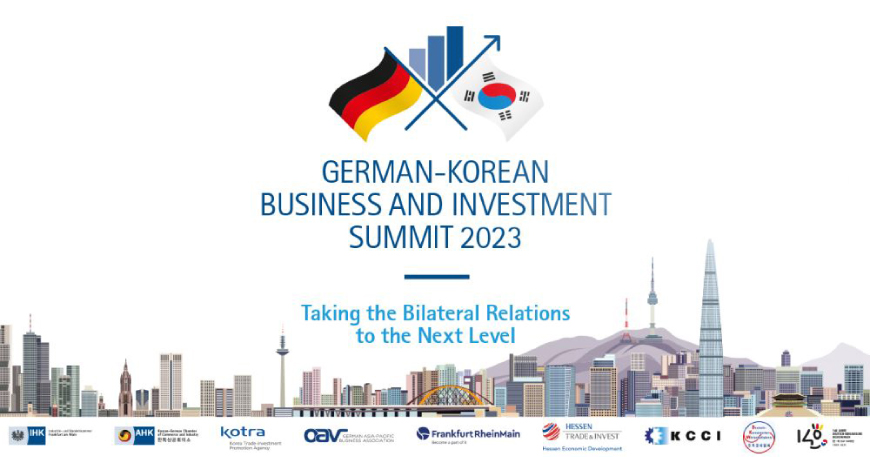
By Grace Park
Executive Consultant
Investment Public Relations Team
Korea Trade-Investment Promotion Agency (KOTRA)










